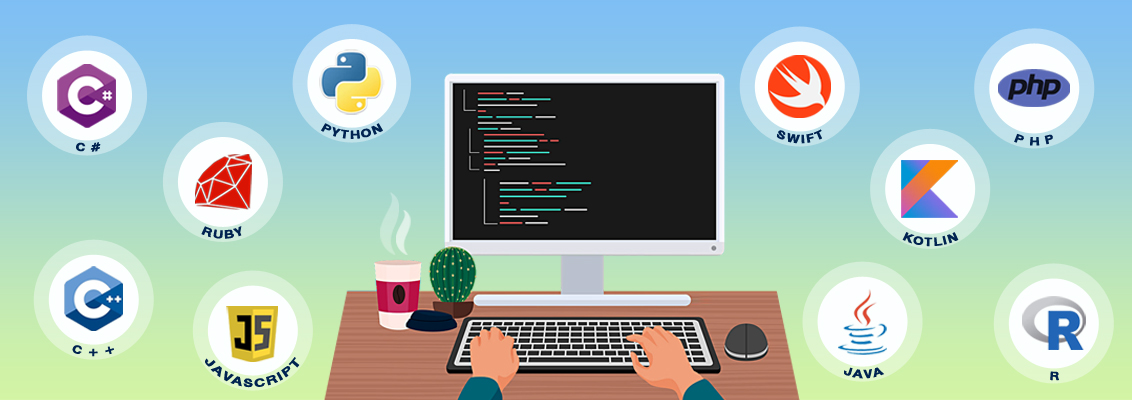
Programing Language Trends
 By ITWorks
By ITWorks
New programming languages are coming up that are suited for different categories of developers (beginners, intermediate, and experts) as well as for different use cases (web application, mobile applications, game development, etc). In this article we will share with you some of the most popular programming languages.
This categorization is based on the criteria:
- Top-ranked in programming languages ranking websites.
- Already are firmly established in the Software Development industry.
Python
Python is at the top of the list.Python is not a disruptive programming language. But from the very beginning, Python has focused on developer experience and tried to lower the barrier to programming so that school kids can also write production-grade code. Python evolved from the language to write automation scripts or swiftly prototype apps to the first-class language for the web and mobile development.
Python features:
- Open-source, object-oriented language
- Cross-platform solutions
- Asynchronous coding design, consistent syntax
- Used for AI and ML, desktop and web apps
- Access to several modules
- Python has first-class integration with C/C++
- Python has a very active community and support
Uses:
- Data Science
- Data Analytics
- Artificial Intelligence, Deep Learning
- Enterprise Application
- Web Development
JavaScript
JavaScript is the “frontend” programming language. JavaScript is widely used to design interactive frontend applications. JavaScript is commonly used to enrich web pages and make them interactive. Using JS devs can add pop-ups, effects, and even small games to web apps.Second most active programming languages on GitHub.
JavaScript features:
- Simplistic implementation
- Gives a richer interface to a website
- Access to several frameworks
- Data validation functionality
- Compatible with several programming languages
Uses:
- Web Development
- Backend Development
- Mobile App Development
- Serverless Computing
- Browser Game Development
Java
Java is another popular choice in large organizations and it has remained so for decades. Java is known to be extremely stable and so, many large enterprises have adopted it. Java is one of the most disruptive programming languages to date. Java has achieved Platform independence by developing Java Virtual Machine (JVM), which abstracted the low-level Operating System from developers and gave the first “Write Once, Run anywhere” programming language. Also, JVM offers generation garbage collection, which manages the object life cycle.
Java features:
- Portable across operating systems
- Stable environment
- High-quality code compilation
- High stability
Uses:
- Enterprise Application Development
- Android App Development
- Big Data
- Web Development
C#
Programming language C# was created in 2000 by Microsoft as part of theirs .NET initiative, which will be managed (run on a Virtual Machine like Java). C# is designed as part of Microsoft’s Common Language Initiative (CLI) platform where many other (mainly Microsoft’s languages) compiled into an intermediate format which runs on a Runtime named Common Language Runtime (CLR). Today, C# is a multi-paradigm programming language that is widely used not only on the Windows platform but also on the iOS/Android platform (thanks to Xamarian) and Linux platform.
C# features:
- Deeply integrated with Windows
- Dynamic variables
- Supports native resource-management idioms
- Enumeration support
Uses:
- Server-Side programming
- App development
- Web Development
- Game Development
- Software for Windows Platform
PHP
PHP is among the most popular backend programming language. PHP is a general-purpose, dynamic programming language mainly used to develop server-side Web applications. PHP is mostly used for web development services. It powers all kinds of websites and web applications as a server-side scripting language.
PHP features:
- Open-source server-side scripting language
- Short learning curve
- Cross-platform
- In-built support for working with MySQL
Uses:
- Server-side Web Application Development
- Developing CMS systems
- Standalone Web Application Development
C/C++
C++ is very close to the C language. It takes the concept of object-orientated programming and combines it with syntax and power of C. Almost all low-level systems such as operating systems, file systems, etc are written in C/C++.
C/ C++ Features:
- Faster execution of programs
- Efficient and easy to understand
- Form the basis for understanding more complex programming languages
Uses:
- System Programming
- Game Development
- IoT and Real-Time Systems
- Machine Learning, Deep Learning
- Embedded Systems, Distributed Systems
Swift
Swift is a multi-paradigm, general-purpose, compiled programming language that also offers high developer productivity. It has excellent interoperability with Objective-C codebase and has already established itself as the primary programming language in iOS App development.
Swift Features:
- Open-source programming language
- Stable version of ABI across Apple’s platforms
- Interoperable with Objective-C
- Simple syntax
Uses:
- iOS App Development
- System Programming
- Client-side development (via WebAssembly)
- Deep Learning
- IoT
R
R programming language is one of the most commonly used programming languages for Data Analysis and Machine Learning. R provides an excellent framework and built-in libraries to develop powerful Machine Learning algorithms. It’s a language to do statistics. R language is used to run R programs and get results (graphics or text) within Mediawiki, the software behind Wikipedia.
R programming features:
- Acts as an interactive statistical environment
- Used for statistical inference, data analysis, ML algorithms
- Runs on Windows, Mac OS
Ruby
Ruby has later evolved into an interpreted, dynamically typed, high-level, multiple-paradigm general-purpose programming language. Ruby is implemented in C and offers garbage collection. Like Python, Ruby focused heavily on developer productivity and developer happiness. Although Ruby is not one of the hyped languages at this moment, it is an excellent language for new developers for a flat learning curve.
Ruby features:
- Dynamic, object-oriented, functional
- Garbage-collected, and concise.
- Excellent tools and framework support
Kotlin
Kotlin is a general purpose, free, open source, statically typed “pragmatic” programming language. Kotlin is also interoperable with Java, which allows developers to use all existing Android libraries in a Kotlin app.
Kotlin features:
- Java interoperability
- Works for front and back-end development
- Supports efficient incremental compilation

